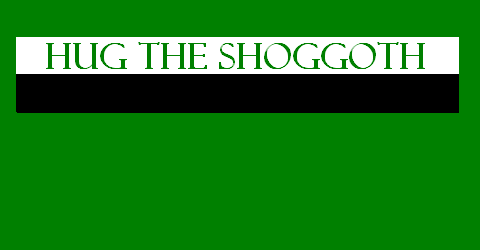A plush teddy to go with the most interesting incarnation of great and mighty Cthulhu? Here it is – tadaa! (via John Brownlee at ectoplasmosis)
As cute as it is – on a cuddling basis – I find the commercial line interesting that goes with it –
Now you can witness Cthulhu in his Dracula form!
First, this doesn’t quite get teratological matters right: Cthulhu is not a shape-shifter (that feat is more the domain of one of the colleagues on the pantheon, Nyarlathotep, the con man of multiple disguises, but of distinct origin: Egypt, and beyond it, the stars!).
Then, isn’t that sentence also an evaluation of the relation Lovecraft’s monster zoo has with more traditional, more deeply-rooted-in-folk monsters like Dracula (who, needless to say, is hardly older as a literary being than, say, Cthulhu – he has something like 20 years on the tentacled one)? That particular relation that David Punter claims does not exist?
Quoth Punter, :
“On the whole, they fail: in cultural terms, their power is nothing compared with that of Frankenstein and Dracula.” (Punter, David. The Literature of Terror. Volume 2. The Modern Gothic. Harlow, Longman, 1996. 45. )
They – he’s measuring here Cthulhu and Robert W. Chambers’ King in Yellow against Frankenstein and Dracula and decrees the former the inferior position at the doorsteps of the great British Gothic symbols, – which position they assume, if at all, only in academic criticism (and certainly British academic criticism) which will be sure to blurp out over-read interpretations of Stoker’s and Shelly’s classics for the next 1.000 academic generations to come.
In literary-cultural terms, Cthulhu has the destruction of the planet up his sleeve and is, of course, a space-travelling alien (without a space ship, that is: space-travelling by birth, if you will), while the vampire has a hard time traversing the sea even to England.
Cthulhu vs. Dracula, 2:0.
In (pop-) cultural terms, Punter’s point doesn’t seem so clearly drawn, either. True. Dracula is one of the strongest signifiers ever to pop into world literature, ever and at all: but where are the Dracula plush teddies (and no, Count von Count doesn’t count, he’s based on Lugosi’s interpretation of the vampire figure), the magical arcana referencing Dracula explicitly as an entity of real-world power, the semi-authentic forbidden tomes you could use to invoke the good sharp-fanged gentleman? Right. Not in this world. Cthulhu has all of these to his credit. That makes a new count,
Cthulhu vs. Dracula, 3:0.
Ha.
